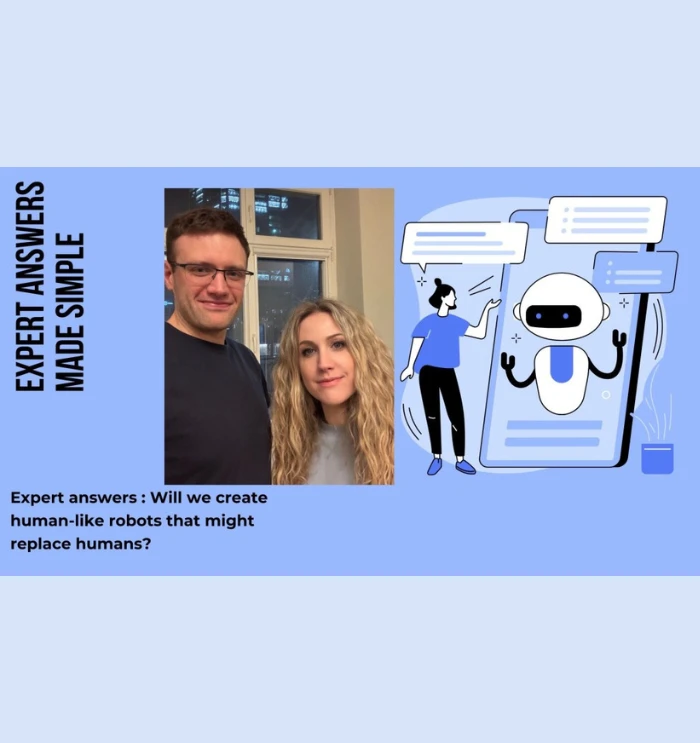Homepage » Episode #7: Will we create human-like robots?
3 Questions to the Expert and 3 answers that explain complex phenomena in a simple way.
In spring, the long-awaited interview finally has seen the light of day. Bazyli Klockiewicz, PhD in mathematics, answered three exciting—and for some, even daunting—questions. It all started, as usual, quite innocently, with my very direct and slightly playful question: “Bazyli, when will you create a robot?”
Bazyli smiled and began telling a story about algorithms and calculations, all set against the backdrop of the unfolding 5.0 technological revolution.
Ania Modrzewska: We see a lot of headlines every day about Artificial Intelligence (AI). That it might replace humans, that it might become self-conscious, that it might spin out of control. How much truth is there to it?
Bazyli Klockiewicz: That is a subject of heated debate even among people at the forefront of AI development. Right now, we have models that are as good as — or better than — humans at certain relatively isolated tasks. For example, we have models that can generate original images based on a written description. You describe in words an image you want to see, and they draw it for you in great detail. You can ask for any topic and style. A skilled human can do it too, but models can do it faster. Each one of them was probably trained on more images than a human could see in a lifetime. They can even generate photorealistic pictures that are extremely difficult for humans to create without an actual camera.
However, if we monitored the brain activity of a human painting a picture, we would probably see only certain areas being active. The human would likely be able to sustain a conversation on a different topic while painting and react to someone entering the room. In other words, human beings are efficient, self-conscious, multitasking “machines” that can analyze and react to data from multiple modalities in real time. AI is not there yet.
Ania Modrzewska: OK, but twenty or even ten years ago, programs that can generate any image upon request would have been science-fiction. What happened? Do we have better computers?
Bazyli Klockiewicz: Until recently, people have mostly used computers as powerful calculators that perform operations designed entirely by humans. For example, to forecast weather, people have developed sophisticated mathematical theories describing the physics of weather, and they have developed techniques to efficiently simulate those theories on computers. The human fully understands and designs the calculations; the computer performs them efficiently.
The idea behind AI is different. Instead of trying to create mathematical theories and simulate them on a computer, we define mathematical objects that can adapt to data. A primary example of that is an (artificial) neural network. It is a mathematical object that generates answers based on data. There is a mathematical formula for modifying the network’s parameters so it can improve its answers as it processes more data. During “training”, the neural network is shown vast amounts of data, portion by portion, until its answers become correct. For instance, ChatGPT is based on a neural network called a transformer that was simply trained to predict the next word (in fact, a sequence of characters) in a sentence based on the preceding words. We don’t have a neat theory of how text can be generated; that knowledge is encoded in the neural network’s parameters.
By the way, last year’s Nobel Prize in Physics was awarded for work on neural networks. (Many physicists were upset because they didn’t consider it “real” physics.) In fact, the ideas behind it are quite old, but training a large neural network requires huge amounts of computation. Around fifteen years ago, people started using computer graphics cards to speed up those computations, and since then, we have been discovering neural networks’ true potential. Today we have specialized AI computer chips that get better and faster every year. So yes, in a way, we do have better computers.
Ania Modrzewska: You said that human beings are more versatile than AI systems. Will that change? Will we create human-like robots? How will it change our lives?
Bazyli Klockiewicz: The models will become more versatile, but I don’t know if they will become human-like. If you think about the transformer that powers ChatGPT, it looks like it understands a lot about our world, but that can be misleading. Imagine that we started receiving messages from an alien civilization on the other side of our galaxy in the form of sequences of numbers between 1 and 50000. (One such message could be: “5, 78, 11, 657, 14500, 6.”) If we received enough such messages, we could try to train a transformer to predict the next number in a message based on the preceding numbers. We could observe that the transformer has learned to perform that task very well, and we could even try to generate responses in the aliens’ “language.” Would we expect to understand anything about life on their planet, though?
This is not to say that models won’t be smarter than us. The most recent models can solve difficult mathematical problems. They have learned to devise solution strategies and self-correct. In other words, perhaps for the first time in history, we have distilled problem-solving intelligence into a program. But I guess we still don’t understand the true nature of things like self-awareness or consciousness and whether they can emerge from operations performed on current computers.
Even so, I think AI will change our lives, perhaps to a similar extent as the Internet has, though it might happen gradually. It will transform a lot of businesses and professions. It will bring its own dangers that each one of us will have to learn to navigate. (Imagine the potential destructive power of being able to generate any video you like!) But to end on a high note, such revolutions — agrarian, industrial, Internet, or now AI — are part of the story of our species.
